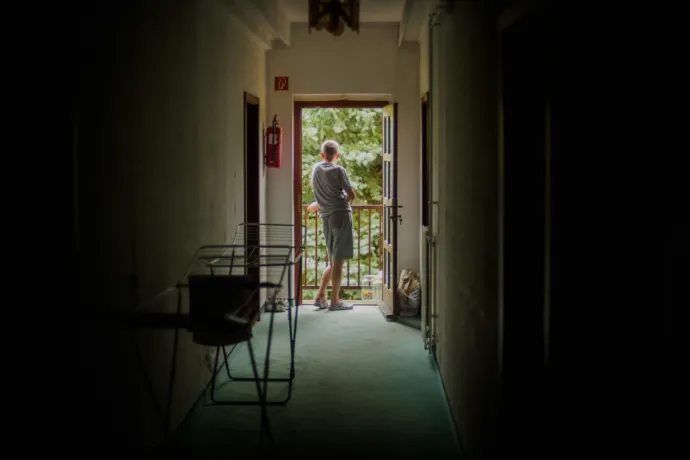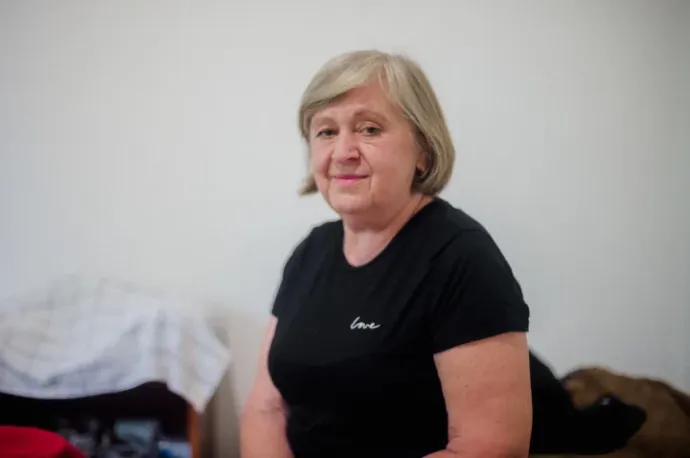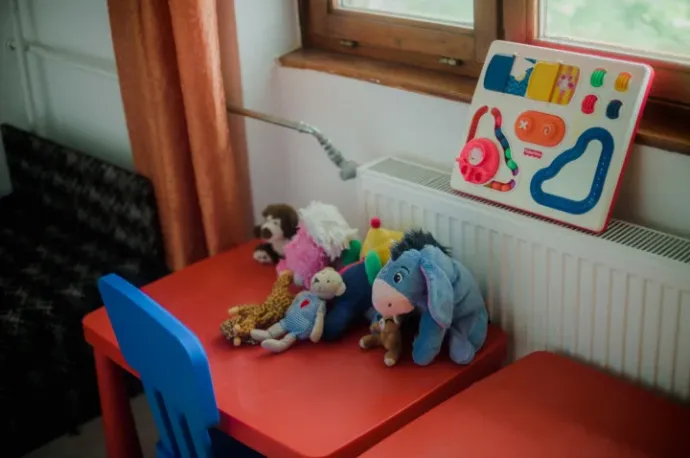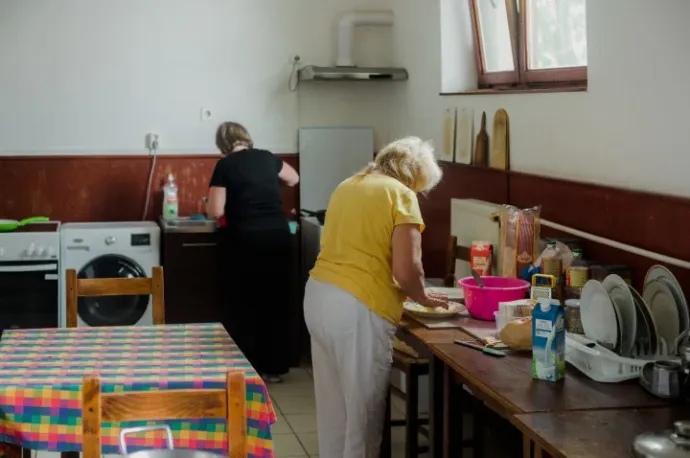My son called me at six in the morning and told me to pack up and leave – Ukrainian refugees in Szeged

"My son called me at six in the morning and told me to pack up and leave as quickly as possible. I was born in 1942, during the Second World War, and now the third one is going on" – the oldest inhabitant of the Aranylabda Guesthouse in Szeged says. The 81-year-old woman left Ukraine for the Hungarian town of Szeged with her grandchildren and daughter on the morning the war between Russia and Ukraine started.
Hundreds of thousands of people have been forced to flee their homes due to the devastation caused by the war that broke out last February, with refugees mostly seeking temporary or long-term shelter in countries neighbouring Ukraine and the Baltic States.
Ukrainian men between the ages of 18 and 50 are not allowed to leave the country on account of general mobilization, so most of those fleeing abroad are women, children or pensioners. In Hungary, the Hungarian Red Cross is the main organization helping the displaced, but the Hungarian Charity Service of the Order of Malta and several NGOs are also doing their part, and the general public is actively helping as well. According to the latest Eurostat data, between the beginning of the war and the end of May, Hungary granted temporary protection status to 31 480 Ukrainian citizens.
The 31 Ukrainians who ultimately ended up in Szeged because of the war are living at Aranylabda Guesthouse in Budai Nagy Antal Street – a quiet, relatively secluded street on the eastern outskirts of Szeged's neighbourhood known as Tápé. Only one of the tenants, a retired woman, speaks Hungarian, because her husband was Hungarian. She told us in detail how she came to be here.
They are grateful for the help
Her room is comfortable, a standard single room in a B&B, with some clothes and canned food stored in bags. At the time of our visit, peeled potatoes were soaking in a plastic bowl, as she was about to make a Ukrainian speciality, a salty pastry similar to Hungarian pogácsa. "We lived in the eastern part of Ukraine. My daughter and grandchild left right at the beginning of the war, and since then my granddaughter has been going to school here in Szeged and my daughter works at the Red Cross.
My husband was very ill at the time and I couldn't leave him.
Then he died, and I came after my daughter', she says with a strong Ukrainian accent.

Szeged wasn't the first destination of the former librarian. Russian missiles reached the eastern-Ukrainian town where they used to live early on and her granddaughter was very scared, so they left the country in the first days of the war. They first reached the Hungarian town of Miskolc near the border, and from there the Red Cross transferred them to Szeged, because it's quite far from the Hungarian-Ukrainian border.
The elderly lady expressed her gratitude amidst tears in broken Hungarian.
"I and all of us who are here are very grateful to the Red Cross and all the Hungarian people, thank you very much for everything."
– she said, visibly touched. People who leave Ukraine usually arrive in Miskolc first, as the Red Cross there is closest to the border. Some stay there, while others choose to go on to another place.
The options include Budapest, Székesfehérvár, Szeged, Győr – with an agency providing assistance in almost every Hungarian city.
They go where the jobs are
Refugees are given all relevant information about the circumstances they can expect in the location of their choice.
"They are shown a picture, you know. Look, here's this guesthouse in Szeged, two or three of you would share a room, compared to Székesfehérvár where you have such and such an option.
And then they choose and say that they'd rather go to Szeged", a Red Cross care worker explains, and points out that communication between humanitarian organizations in different cities about the number and quality of available places and the possibilities for care is constantly ongoing.
This is how the only male resident of the boarding house ended up in the city. He used to work as a hydrology engineer and is now 62 years old and retired. Originally from the eastern part of Ukraine, he left the country in the first months of the war. He was first sent to the refugee camp in Záhony, then the Red Cross found a free place for him in Szeged. He looked at photos of the city in the southern part of Hungary's Great Plain and decided he wanted to go there.

Budapest is the most popular destination for refugees, but a surprising number of them choose Győr and the opportunities in Western Hungary, mostly in hope of finding work. "One of our tasks is to help refugees find work, which is unfortunately difficult here in Szeged, there aren't really any job opportunities. In comparison, almost all refugees in Szentes and Hódmezővásárhely are working," Tímea Ambrus Rákos, a staff member of Red Cross' Szeged office explains. Those who can't find work are also provided with accommodation and meals.
"We buy and distribute fresh and non-perishable groceries among them on a weekly basis, paying special attention to the nutritional intake, because there are many elderly people and children here, and someone always falls ill. If that happens, we also buy the medicine," the Red Cross worker says. In the building of the Aranylabda Guesthouse, which the organization rents from a private individual,
of the 31 people cared for, 10 are still children, almost all of them of kindergarten age,
so the Red Cross and the House of National Minorities in Szeged often help families dealing with language barriers when placing their children in kindergarten.
Citizens with a sense of sacrifice
As the caretakers see it, the Hungarian state only supports the work of the humanitarian organization indirectly, i.e. any financial support is not sent directly to the Red Cross, but to the municipal authorities of the town where the organization operates, and the municipal authorities then pass the support on to the Red Cross. This funding may be claimed within the framework of a normative grant for refugees.
Anyone who wishes to accommodate refugees in Hungary can apply for this,
even if they are housing refugees in their own home.

According to the care workers, most of the Ukrainians who came to Szeged were taken in by private citizens, who are mostly using the above-mentioned normative support, but there are also examples of people helping refugees at their own expense. "In Szeged, the Red Cross only has this one building where we care for refugees", one of the care workers summarizes.
The Szeged guesthouse is almost exclusively occupied by mothers and their children, due to the general mobilization in Ukraine. At the beginning of the war, the regulations about leaving the country were more permissive, and in the first months even men over 50 were allowed to cross the border. They are no longer allowed to leave the country however, as they were conscripted into the army reserves at the beginning of the war.
Only pensioners and the sick are permitted to leave. There is only one known case in all of Csongrád county where the father was allowed to come with his children. He came to Hódmezővásárhely with his three children, because at that time fathers with large families were still allowed to leave the country.
The author is a journalist of Szegeder. This article is published as part of the cooperation between Szegeder and Telex.
For more quick, accurate and impartial news from and about Hungary, subscribe to the Telex English newsletter!